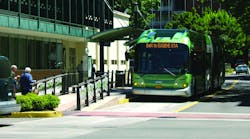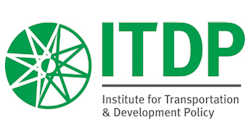Institute for Transportation and Development Policy Releases BRT Standard 2013
The Institute for Transportation and Development Policy (ITDP) today released the first comprehensive BRT Standard, a defining and scoring designation for bus rapid transit (BRT) systems around the world. Similar to the LEED designation for green buildings, BRT corridors may achieve a basic BRT, bronze, silver or gold designation. As a joint effort by the world’s foremost experts in bus rapid transit design, The BRT Standard scored 50 corridors in 35 cities. Of these, 16 classified as bronze, 20 as silver and 12 as gold.
Funded by The Rockefeller Foundation, The BRT Standard is the centerpiece of a global effort by leaders in BRT design to establish a common definition for bus rapid transit and to ensure that BRT systems more uniformly deliver world-class passenger experiences, significant economic benefits, and positive environmental impacts.
“Despite the increasing prevalence, prominence and success of BRT systems, many people remain unaware of the characteristics of the best BRT systems and their potential to provide levels of service typically associated with metro and subway systems,” said ITDP CEO Walter Hook. “From Mexico City to Guangzhou, and from Cleveland to Las Vegas, BRT has helped revitalize city centers, speed commutes and improve air quality. The BRT Standard 2013 will clearly define what a BRT is once and for all and our hope is that it encourages cities to adopt this cutting-edge form of mass transit.”
The BRT Standard functions as both a scoring system and a planning tool. By laying out the essential elements of BRT, it provides a framework for system designers, decision makers, and the transport community to identify and implement top-quality BRT systems. The BRT Standard celebrates cities that are leading the way on BRT excellence, and offers best practice-based guidance to those in the process of planning a BRT system.
The BRT Standard scores more than 30 elements of BRT corridor design, with points awarded for elements that most significantly improve operational performance. They include:
• BRT Basics, e.g. median-aligned busways, dedicated right of way, platform-level boarding, off-board fare collection, and intersection treatments that allow buses to travel more freely through intersections in order to improve speed of transit.
• Service Planning, e.g. multiple routes running on the corridor and longer hours of operation to expand access to BRT as a popular mode of transit.
• Infrastructure, e.g. passing lanes at stations, high-quality pavement, and minimized bus emissions to reduce environmental impacts.
• Station Design, e.g. wide, weather-protected stations that are more attractive and comfortable to commuters, and multiple doors on buses for faster boarding.
• Quality of Information, e.g. cohesive branding and real-time passenger information to enhance BRT system recognition and ease of use.
• Integration and Access, e.g. disability access, integration with other public transport, and bicycle-sharing integration to increase overall usability.
For complete scorecards and a breakdown of categories, please visit brtstandard.org.
Two committees govern The BRT Standard: The Technical Committee and the Institutional Endorsers. ITDP convenes both committees. The Technical Committee comprises globally renowned experts on BRT. This committee serves as a consistent source of sound technical advice with respect to BRT, and is the basis for establishing the credibility of The BRT Standard and related international best practices.
The 2013 BRT Standard Technical Committee members include:
- Manfred Breithaupt, GIZ
- Wagner Colombini Martins, Logit Consultoria
- Paulo Custodio, Consultant
- Walter Hook, ITDP
- Colleen McCaul, Consultant
- Gerhard Menckhoff, World Bank
- Carlos Felipe Pardo, Slow Research
- Scott Rutherford, University of Washington
- Pedro Szasz, Consultant
- Lloyd Wright, Asian Development Bank
The Institutional Endorsers are an integrated group of highly respected institutions in the fields of city-building, public transport systems and climate change, with decision-making abilities over The BRT Standard certification process.
The 2013 Institutional Endorsers of The BRT Standard include:
- Institute for Transportation and Development Policy (convener)
- ClimateWorks Foundation
- Gesellschaft für Internationale Zusammenarbeit (GIZ)
- Rockefeller Foundation
- International Council on Clean Transportation (ICCT)




